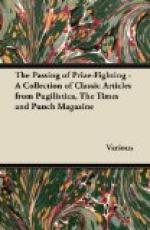“None have actually hove in sight at present,” I said reassuringly, “but there is a sound of one in the offing—in the wainscoting, I mean.”
“In a residence of your size I should say that a single mouse would constitute infestation within the meaning of the Act, so soon as it forces an ingress. It will then be your bounden duty to demolish it. How about purchasing a trap?”
“You are sure that is better than hiding behind the arras and hitting it over the head with a pole-axe?” I inquired anxiously, “or proffering it a bowl of poisoned wine?”
“Poison is no longer supplied free,” he answered coldly, and I went out.
Very luckily, as I hastened up the hill, I had observed a building with the words, “Job Masters. Traps for Hire,” written upon a wooden board. I went inside and found an elderly man sitting at a desk in a small office. He looked extremely patient. “Are you Job?” I asked breathlessly. “I have come to buy a mouse-trap.”
Appearances, of course, are quite often deceptive. They were in this case. The elderly man was very much annoyed. When he had explained matters forcibly to me I went on down the hill and entered an ironmonger’s.
“I wish to buy a trap to catch a mouse,” I said to the assistant behind the counter.
“Certainly, Sir. What size?” said the lad politely.
“Small to medium,” I replied, rather baffled. “It has only a medium-sized scratch.”
He showed me a peculiar apparatus made of wire and wood containing apparently a vestibule, two reception rooms, staircase and first-floor lobby, with an open window and a diving-board. Underneath the window was a small swimming tank.
“I don’t want a hydropathic exactly,” I explained. “I propose to exterminate this rodent, not to foster longevity in it. How does it work?”
He pointed out that, after examining the various apartments, the animal would be allured by the fragrance of a small portion of cheese placed above the diving-board; overbalancing, it would then be projected into the water, where it would infallibly drown. “It is a thoroughly humane instrument,” he assured me, “and used in the best ’omes.”
I bought it and went on to a cheese foundry. Araminta was rather scornful of the sanatorium when I came home with it and set it, loaded and trained, on the dining-room floor; but the children were delighted. It ranked only a little lower than the pantomime, and if only we could have secured an outside visitor to it I believe that it would have defeated the Zoo. To visit it with a sort of wistful hope became the principal treat of the day. But, alas, the mansion remained untenanted. Sometimes during a lull in conversation we would hear the faint scuffling again, but after about six days I became convinced, by kneeling down and placing my ear to the carpet like an Indian, that the noise was even fainter than it had been at first. A terrible suspicion seized me. I dashed out and rang the bell of the flat next door.




